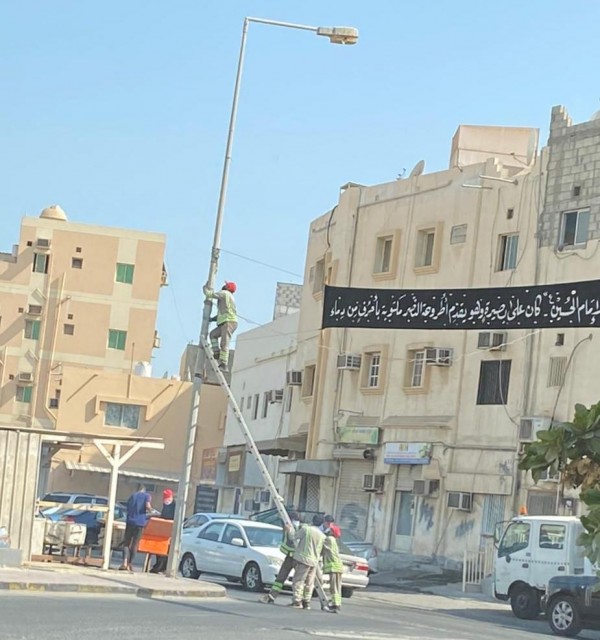3 NGOs Confirm that Bahraini Authorities Exploited Covid-19 Pandemic to Restrict Religious Freedoms during Ashura Season

2021-09-04 - 4:51 am
Bahrain Mirror: Three Bahraini human rights organizations issued a statement in which they expressed their concern about the Bahraini government's exploitation of the Covid-19 pandemic to restrict the religious freedoms of Shia citizens during 2021 Ashura season.
The statement issued by Bahrain Forum for Human Rights, SALAM for Democracy and Human Rights and Gulf Institute for Democracy and Human Rights said "On August 8, 2021, the Ministry of Justice and Islamic Affairs set precautionary measures during the Ashura season based on the recommendations of the National Medical Taskforce for Combating the Coronavirus. These measures included restricting the Ashura rituals in terms of limiting the participation of citizens to the minimum number possible, as the mourning processions were limited to the area in front of the Ma'tam (Shia place of mourning). On the ninth and tenth days of Muharram, the Covid-19 risk of spreading reached orange levels."
They added that the participation of citizens in the Ma'tam was limited to 30 only. Funeral processions were also prevented and narrowed to small spaces crowded with participants in front of these religious institutions and endowments (Ma'tams and Husseiniyas), in spaces that violate the principle of social distancing. Immediately after the tenth day of Muharram, the state of the country's risk level was returned to the green level. At the same time, the mourning processions were prevented from going out to public streets in some Ma'tams.
"The Ministry of Interior summoned preachers, eulogy reciters, funeral directors, and citizens who participated in the Ashura rituals with the aim of interrogating them, as well as those who hung religious banners on the wall of their house. Subsequently, financial penalties ranging from 200 to 1,000 Bahraini dinars (500 to 2,500 US dollars) for violating Covid-19 procedures were issued," the statement read.
"One case of a preacher being beaten at Al-Qudaibiya Police Station was recorded, the Ma'tam administrations were held responsible for individuals violating the precautionary measures. Besides, several arbitrary arrests were carried out."
"It was documented that the community police photographed the participants taking part in the mourning processions, followed them after the rituals ended, and recorded their car plates numbers. The community police photographed the houses that hung black signs on the walls of their house or on top of their roofs, and imposed checkpoints to intimidate participants by setting up financial penalties."
The three organizations indicated that the task of infringing on the Ashura banners was referred to the municipal affairs to cover up the security role in violations. The Ministry of Works, Municipal Affairs and Urban Planning removed and tore black banners. It also confiscated black flags apparently to cover up the role of the Interior Ministry. The citizens taking photos and recording videos of security personnel infringing on the Ashura manifestation was an explicit condemnation, thus the authorities resorted to an official civil body.
The statement further stated that an Iraqi preacher, Sayed Hashem Al-Battat, was prevented from preaching by the Nationality, Passports and Residence Affairs. Complaints were also received from prisoners in Jaw Prison's Building 12 and 5 stating that they were prevented from practicing their religious rituals at the beginning of the Ashura season.
The right to practice religious rites and exercise religious freedoms is one of the rights guaranteed by the 22nd article of the Bahraini constitution, which stipulates that "Freedom of conscience is absolute. The State guarantees the inviolability of worship, and the freedom to perform religious rites and hold religious parades and meetings in accordance with the customs observed in the country." Bahrain also ratified the International Covenant on Civil and Political Rights, which states in its 18th that "Everyone shall have the right to freedom of thought, conscience and religion. This right shall include freedom to have or to adopt a religion or belief of his choice, and freedom, either individually or in community with others and in public or private, to manifest his religion or belief in worship, observance, practice and teaching." We stress that every religion and sect has its specificity in performing rituals, and the state is responsible for guaranteeing this right and shall not interfere in it.
The Bahraini human rights organizations called on the Bahraini government "to respect the right to practice rites, religious freedoms, and the independence of religious affairs; stop targeting Shia citizens; not to restrict the practice of Husseini rites; not to interfere in issues related to Ma'tam, Hussainiyas, and mourning ceremonies; stop summoning preachers, eulogy reciters, and citizens and those responsible for the mourning and funerals with the purpose of investigating them; and hold accountable those involved in violating religious freedoms."
The human rights organizations also called on the government to allow the UN Special Rapporteur on freedom of religion or belief to visit Bahrain in order to put an end to violations of freedom of religion or belief.
- 2024-07-10Bahraini Authorities Summon Head of Sanabis Ma'tam, Threaten "Actions" Due to Mourners' Chants Against Israeli Occupation
- 2024-07-10Political Prisoner Mohammad Al-Raml's Family Say He's Vomiting Blood Due to Poor Conditions, Fear for His Life
- 2024-07-09Ali Al-Majed Arrested After His Return to Bahrain
- 2024-07-08Yusuf Al-Muhafdha: Convicted Returnees to Bahrain Have the Right to a Lawyer, Retrial, and Legal Guarantees
- 2024-07-08Reciter Mahdi Sahwan: Head of Manama Police Informed Me of Ban on Reciters Traveling to Commemorate Ashura